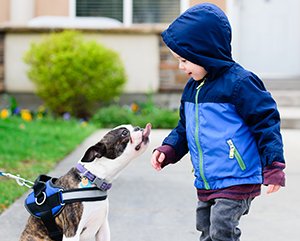Teach young children how to be safe around dogs
Marilyn J. Peitso, MD, Pediatrician
CentraCare Clinic – Health Plaza Pediatric Hospitalists
 The end of the school year brings lots of changes for families. But one of the best is more bike rides, trips to the park and just getting out-and-about. While there are tons of positives about all this activity — there is at least one potential change-in-season danger that parents with young children should be aware of.
The end of the school year brings lots of changes for families. But one of the best is more bike rides, trips to the park and just getting out-and-about. While there are tons of positives about all this activity — there is at least one potential change-in-season danger that parents with young children should be aware of.
Of the 800,000 Americans who medical treatment for dog bites each year, more than half are children. Kids also are much more likely to be severely injured from dog bites.
For obvious reasons, young children can find dogs fascinating and exciting. But they may not know how to be gentle with a dog. They may rush up on a dog, due to their excitement. Young children also may be unable to pick up on the signs that a dog doesn’t want to be bothered.
To help stay safe, teach the following lessons to your kids about dogs:
- Ask a dog owner if it’s OK before petting a dog.
- Reinforce the importance of moving calmly and slowly around dogs. Even if your child doesn’t like dogs, it’s good to teach him or her that running or panicking around a dog can possibly cause it to become excited and chase.
- Let the dog sniff you before petting and then pet it gently — staying away from the face or tail.
- Teach children that one should not bother a sleeping, eating or dog caring for puppies. Dogs in these situations may respond aggressively.
- Discourage your children from rough play with a dog (wrestling, playing tug-of-war, etc.) Most dog bites occur while interacting with familiar dogs. So even if your child is used to your home’s friendly dog, it’s good to remind what behavior is and isn’t appropriate with a pet.
- Tell your child not to approach any dog that is growling or barking. If this happens, teach your child to slowly walk away from the animal.
If your child does suffer a dog bite:
- Immediately wash the wound with soap and water. Call 911 if the injury is severe enough to require emergency medical care.
- Request proof of rabies vaccination from the dog's owner. Or ask for the name of a veterinarian who could provide this information. Rabies is present in Minnesota and is a very serious and often fatal disease. So you should work diligently with your child’s health care provider to determine the risk of exposure and if your child should start treatment for his or her protection.
- Your child’s health care provider also can let you know if additional antibiotics or tetanus vaccines are necessary. He or she can help you report the incident to your local police, if needed.